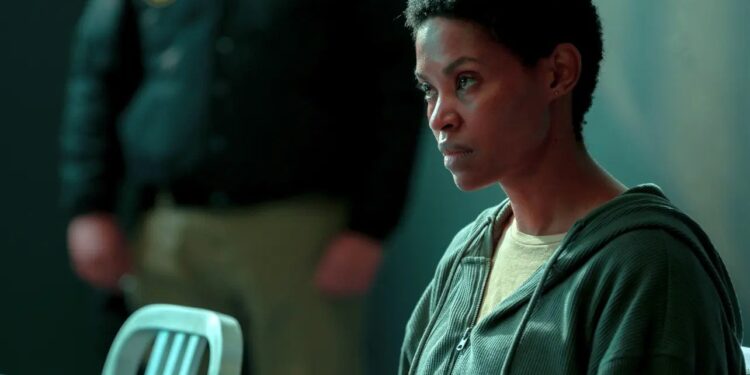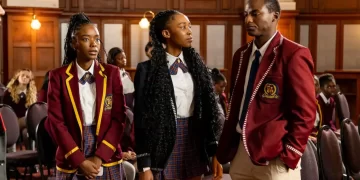Unseen is a new South African six-part crime thriller series on Netflix. It’s based on a Turkish series titled Fatma that I’ve never seen and had just heard about upon receiving this assignment. The title of this South African iteration is derived from one of its main character’s’ ‘assets’, a cleaner called Zenzi, played by Gail Mabalane of Blood & Water, who, by being in the service industry, nobody cares much about or gives any thought to. She is unseen.
To explain my response to this show, to all six episodes, I will employ a bit of metatextuality by referencing a kindred character from this same show. Lufuno (Mothusi Magano, Blood Psalms), is a celebrated writer who, upon spending a few years as Zenzi’s employer, develops a liking and good relationship with her and resolves to write his new novel with a cleaner as his protagonist. I can see the literary merit of pursuing a character that we ‘let into our homes, let into our lives, let them know everything about us, without knowing a thing about them.’ When he takes some pages to his publisher, they tell him, of course, that he’s one of their most valued scribes – we must always stroke the ego of a person who wants to be read – but that the whole character of a cleaner isn’t, and here they pause for practised consideration, compelling enough. The publishers don’t think it will make them much money. They think it will be a bore.
I am the publisher in this review and the writer is, well, the writers and producers of this show.
Of course, Mabalane is one of our most valued actresses in South Africa and the continent. But the role of a cleaner I do not find, umm, what’s the right word, ah yes, compelling enough. I cannot bring myself to care about a character with no direct urgency beyond finding her idiot husband (played by Vuyo Dabula, Queen Sono). Things happen to her—crime drama things. What the show is attempting to do differently is play out what happens in the shadows, after those crime dramas have ended—the unseen drama. Listen, there must’ve been a reason these segments remained out of view, and frankly, nobody was missing out on anything.
Lufuno, the writer, is, of course, on to something when he pulls out his voice recorder and outlines his new book’s philosophy. But he’s thinking about a book in which we can investigate the interiority of a character and dredge up whatever depth and nuance there is in any given subject. Someone once said that every movie or show’s story, plot, philosophy, insight and teachings could be written on the pin of a head. This is not a medium for complex ideas. Primarily, it’s entertainment. By the season finale, Zenzi, as a character, seems more alien to us than when we are first introduced to her. She goes on this journey and runs through the top, most dangerous men in the underworld and, in all instances, kills them without much trouble. I guess it was intended to be an irony, but it plays instead as an absurdity. By the end of the season, we still do not understand how Zenzi is able to overcome basic fear and natural cowardice in the face of everything that happens in this show. Well, why? How? Those flashbacks that detail the love between her and her husband do not suffice for me.
Mabalane, on the other hand, gives a convincing performance, which means she allows the show to be carried by other characters. She is, again, unseen. Though we see her in almost every shot, it feels like she’s hardly there. Brendon Daniels (Skemerdans), who plays Raymond, an underworld syndicate underling, is forced to conspire with Zenzi and then eventually hunts her down. He’s the kind of douchebag who acts very tough indeed with a gun in front of small children, but when tied up to a chain by adults, facing the mother of the boy he murdered, he begs for the inhaler in his pocket. A fascinating man. The best parts of Unseen are the visceral death scenes. As Zenzi embarks on this mission to find her missing husband, she leaves a wake of bodies in her path. These characters die gruesomely, and their faces are perversely lingered on. The human tragedy of death is further highlighted by the reaction of the otherwise harmless Zenzi to what she’s done. It’s real and unpolished, and those are the best scenes in the show.
Unseen, on the whole, lacks any wow or shock factor completely. Its resolution is predictable, and one can see it coming episodes away. There isn’t much to be said about a show that doesn’t notice itself making fun of itself. Maybe the cleaner’s story finally needs to be told, and in that case, it would be more interesting if being a cleaner and a wife weren’t the only attributes of her personality. But the show is out for everybody to view. I, however, have seen it, and should there be a season two (which is doubtful due to the story actually coming to an end) I will not be tuning in. I will leave their Netflix suggestion on… seen.
Unseen is available to stream on Netflix.











